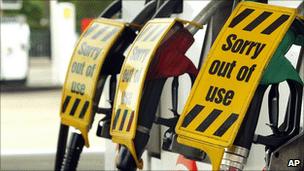UK 'must accelerate' on low-carbon road
- Published

The government has just cut support for bio-energy and other schemes
The UK risks being left behind in the low-carbon future unless government spending is first protected and then increased, say advisers.
The Committee on Climate Change (CCC) report comes days after the coalition announced ÂĢ34m cuts to investments in offshore wind, geothermal and biofuels.
The committee warns that other countries are spending much more.
Meanwhile, Conservative MP Tim Yeo has issued a pamphlet urging more radical moves such as privatising motorways.
The chairman of the Climate and Energy Select Committee says that working towards a low-carbon economy is essential to Britain's future prosperity.
Six of the best
The Committee on Climate Change is charged with advising government on how it should meet its medium- and long-term targets for reducing greenhouse gas emissions, in particular the goal of cutting emissions by 80% by 2050.
Maintaining and increasing investment in low-carbon technologies now, it says, is essential if the 2050 target is to be hit.
Last week, the Department for Energy and Climate Change (DECC) announced cuts in its grant programmes as part of the overall cost-cutting drive across Whitehall.
"That is unwelcome, it is a move in the wrong direction," said CCC chief executive David Kennedy.
"However, it's very specific in the sense that it relates to this year, it relates to the ÂĢ6bn economy-wide cuts.
"More important for us is the next 10 years, and that's what focuses on."
Offshore wind, wave and tidal power, carbon capture and storage, "smart" electricity grids, electric vehicles and cleaner aviation are six areas in which the committee says government support is essential.
"We've got a government that wants to be the greenest ever," observed Mr Kennedy.
"We have funding commitments from the previous government, and they should be regarded as a minimum.
"By international standards our spend is very low; the US for example spends three times as much as we do relative to GDP on low-carbon inovation, and China is very active in renewable energy, energy-efficient buildings, electric cars and clean coal."
Unless UK spending increased, he said, the country risked being left behind.
Pricing is right
This theme was picked up by Mr Yeo in Green Gold: The Case For Raising Our Game On Climate Change, published by the Tory Reform Group.
"We must beware of China who, behind a smokescreen of recalcitrance in international talks, is moving faster than most Western countries to decarbonise its economy," he writes.
"We risk waking up in 10 years' time to find that suddenly China is hawkish about the need for tougher limits on global emissions and for faster action to cut them."
As well as fast de-carbonisation of the energy sector, he urges introduction of road pricing schemes and the privatisation of motorways.
He argues this would induce people to make low-carbon transport choices more effectively than any other single measure.
The country should also begin an experiment with tradeable personal carbon allowances.
The recession, he says, must not push climate concerns into the long grass.
"Britain faces serious economic challenges but we cannot afford for climate change to fall down the agenda," he writes.
"If we lead the way in switching to a low carbon economy, we will reap the rewards as going green will be rewarded with gold."
- Published15 July 2010
- Published12 July 2010
- Published30 June 2010
- Published2 June 2010